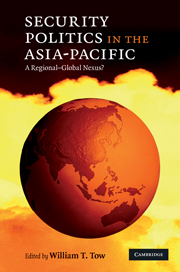Book contents
- Frontmatter
- Contents
- List of illustrations
- About the contributors
- Preface
- Acknowledgements
- List of abbreviations
- 1 Setting the context
- Part I
- Part II
- 6 Hegemony, hierarchy and order
- 7 Democracy and security in East Asia
- 8 Security community-building in the Asia-Pacific
- 9 Human security and global governance
- 10 The economics–security nexus in the Asia-Pacific region
- Part III
- Part IV
- References
- Index
7 - Democracy and security in East Asia
Published online by Cambridge University Press: 05 June 2012
- Frontmatter
- Contents
- List of illustrations
- About the contributors
- Preface
- Acknowledgements
- List of abbreviations
- 1 Setting the context
- Part I
- Part II
- 6 Hegemony, hierarchy and order
- 7 Democracy and security in East Asia
- 8 Security community-building in the Asia-Pacific
- 9 Human security and global governance
- 10 The economics–security nexus in the Asia-Pacific region
- Part III
- Part IV
- References
- Index
Summary
Does it matter for security in East Asia whether governments operate democratic or authoritarian regimes? Where democratic change has taken place, do governments grow so accountable to their citizens that security is enhanced? Conversely, are governments that operate authoritarian regimes so unchecked that they are necessarily reckless in their policy-making, causing security to diminish? This chapter marks a preliminary effort to address these questions about causal relations between democracy and security in the East Asian setting. We will see that their answers have both regional and global implications. They show how governments in East Asia that operate different kinds of political regimes may achieve different security outcomes. Hence, they bear lessons too for governments outside the region which, in seeking to promote security, may favour particular regime types.
In this analysis, democracy is understood in ‘minimal’ procedural terms. In its twin dimensions, then, specified by Robert Dahl (1971), democracy involves respect for civil liberties, most notably, freedoms of communication and assembly, coupled with elections that are regular, fair and meaningful in their determination of top position-holders who wield state power. Following the Copenhagen School (Buzan, Wæver and de Wilde 1998), however, security is conceptualised in a more ‘holistic’ way. Though it includes traditional concerns of territorial integrity and sovereignty, the notion of security – and the discourse about security that governments conduct – has come in the wake of the Cold War to embrace such issues as economic development, cultural outlooks and sustainable environments.
- Type
- Chapter
- Information
- Security Politics in the Asia-PacificA Regional-Global Nexus?, pp. 122 - 143Publisher: Cambridge University PressPrint publication year: 2009
- 2
- Cited by

